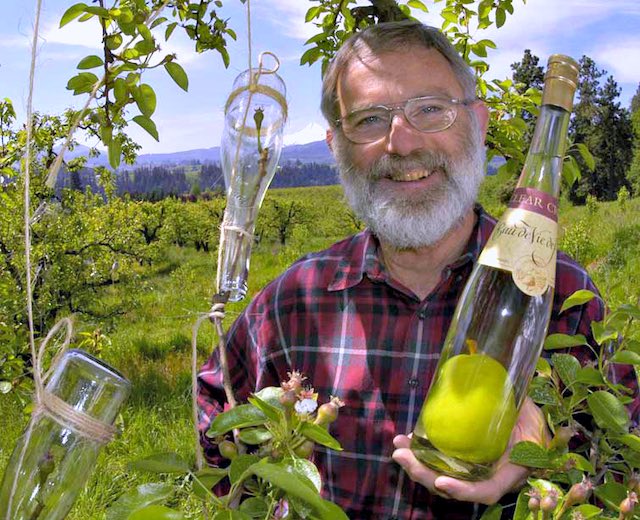My first real job was a summer internship with the Oregon Student Public Interest Research Group (OSPIRG) in 1972. Steve McCarthy was the flamboyant director of OSPIRG, and my work that summer on low-cost ways to improve TriMet, Portland’s transit system, helped propel him into the job of TriMet’s general manager. He implemented some of my suggestions and made other improvements and by the end of the decade Portland was one of the few urban areas in America where transit ridership had grown faster than driving.
Steve McCarthy growing pears in bottles that will soon be filled with Clear Creek pear brandy. Photo courtesy of Clear Creek Distillery.
Nearly two decades later, Steve invited me out to lunch in Northwest Portland where he had started a new business making pear brandy. Over lunch, he told me that after leaving TriMet he took over his father’s business making hunting accessories and then bought a pear orchard in Oregon’s Hood River Valley, where his family had been in the fruit-growing business since 1910. He wanted to prove to other orchardists that they could make more money by adding value to their fruit than by just selling fruit to grocers.
“In all the years I was working for OSPIRG and TriMet, I felt like I was pushing a rock uphill,” he said. “Then, when I took over my father’s business, I discovered what power you can have when you have the market behind you.”
In taking over an old fruit orchard, however, he ran into a dilemma. Naturally, he wanted to install an efficient irrigation system so he wouldn’t waste water. But the local water master informed him that he would have to install a highly inefficient system so that he wouldn’t lose the water rights that came with his land. He couldn’t understand why that would be.
I told him that, under the water laws of Oregon and other western states, people with water rights were not allowed to sell those rights, and as a result, most water was very poorly used. What was needed was a state law allowing irrigators to sell their rights, perhaps even selling them to conservation groups so that the water could be left in the streams for fish.
Within a year or so of that lunch, the Oregon legislature passed a law allowing conservation groups to buy water rights from farmers and leave the water in the streams. I’m pretty sure Steve had something to do with that law. Soon after that, a group called the Oregon Water Trust was formed that has since bought water rights in the Deschutes, John Day, Rogue, and Willamette river watersheds.
After lunch, Steve took me to his shop, showed me his stills, and let me taste his pear brandy. It smelled and tasted exactly like fresh pears, earning the name eau-de-vie (literally, “water of life”; figuratively, “essence of the fruit”). It proved to be the only alcoholic beverage I’ve ever enjoyed. Steve and Clear Creek became nationally famous for this brandy and, later, for its small-batch whisky.
Steve passed away last week of Parkinson’s disease. He was one of the few people in Oregon who could say they had a major impact on the state in both the public and private sectors, and I am glad to have known him.









When I first looked at the picture, I wondered how he got the pear into the bottle. Then I saw the answer — in the picture.